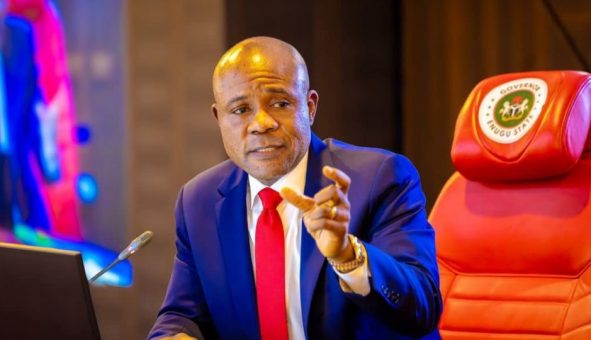In the turbulent theatre of Nigerian politics, where ambition often eclipses ideology and personalities loom larger than parties, the unravelling of the People’s Democratic Party (PDP) is less a sudden collapse than a slow, self-inflicted implosion. At the heart of this disintegration lies a paradox—one man’s ambition sold as salvation, and another’s departure emerging as a statement of conscience.
The defection of Governor Peter Mbah from the PDP to the ruling All Progressives Congress (APC) is not merely a political shift—it is a clarion call. Mbah’s exit is a verdict, not on party loyalty, but on the corrosion of democratic ideals within the PDP under the shadow of Minister Nyesom Wike. What was once Nigeria’s flagship opposition party has, under Wike’s self-serving stewardship, become a vessel for personal vendettas and factional hegemony.
For years, Wike cast himself as the party’s fire-fighter and financier—its loudest voice in opposition and its most relentless organiser. But his actions since the 2023 general elections have told a different story: of a man who mistook influence for ownership, and loyalty for submission.
When Wike was denied the PDP’s presidential ticket, he responded not with magnanimity or unity—but with retribution. His bitter fallout from the nomination process metastasised into open warfare within the party. What followed was an unprecedented centralisation of control, erosion of internal democracy, and the alienation of governors, stakeholders, and longtime loyalists.
In this climate of coercion, Peter Mbah’s decision to leave the PDP takes on symbolic weight. This was not a quiet political calculation—it was a declaration. A rejection of a system that demanded obedience to a single man rather than fidelity to principle. For Mbah, and for many watching closely, the PDP ceased to be a democratic coalition and became a personality cult, hostage to Wike’s whims.
“This is not betrayal,” one close aide to Mbah told Time Africa. “It’s preservation of dignity. Of political sanity. Of the very idea that parties must stand for something larger than one man’s ambition.”
Indeed, Mbah’s departure is only the first tremor. Across states once considered strongholds of PDP influence, unrest simmers. Governors and party operatives speak in hushed tones of marginalisation, of policies made without consultation, and of a national leadership more concerned with personal fiefdoms than national progress.
What distinguishes Mbah in this moment is not merely his choice—but his timing. He did not wait for consensus or camouflage. He acted first, and in doing so, revealed the depth of disillusionment within PDP ranks. Others will follow. Not because of opportunism, but because the party’s centre no longer holds.
It is tempting to see this as yet another Nigerian political drama—a carousel of defections, driven by expedience. But such cynicism would obscure the real gravity of the moment. Mbah’s move challenges the status quo not out of desperation, but out of determination to reclaim integrity in political alignment.
In stark contrast, Wike’s leadership has been marked by spectacle and suppression. His claim to ownership of the PDP—publicly and privately asserted—is not only anti-democratic; it is historically tone-deaf. Political parties are not personal enterprises. They are institutions of shared vision, built on trust, consensus, and procedural legitimacy. The moment they are reduced to platforms for personal glory, they begin to decay.
Wike’s behaviour since the election has led not to party growth but fragmentation. His insistence on loyalty to himself over loyalty to party ideals has catalysed mass dissatisfaction. The result is a house divided—where strategy gives way to suspicion, and where Mbah’s departure is seen not as an aberration, but as the beginning of a broader exodus.
And therein lies the central irony: the man who claimed to rescue the PDP may be remembered as the one who dismantled it. Not by sabotage from outside, but by a refusal to listen, to share power, or to honour the very principles he once professed to defend.
Meanwhile, Mbah’s quiet defiance may well be the seed of something new—a realignment grounded not in personality, but in values. In a nation fatigued by transactional politics, his stance represents something rare: a stand for conscience over convenience.
In choosing the APC, Mbah does not declare that party perfect. What he signals is a refusal to be tethered to a sinking ship captained by a man who mistakes fear for loyalty. He, and those poised to follow, are not abandoning principle—they are abandoning the absence of it.
The PDP now faces an existential question: can it survive the Wike era? Can it rebuild itself as a true opposition party, guided by institutions rather than individuals? Or will it remain a cautionary tale of how unchecked ambition, when placed above collective purpose, leads to ruin?
As history turns its gaze upon this moment, it will likely see Peter Mbah not as a deserter, but as one of the few who recognised the danger in time—and walked away with his values intact. In doing so, he may have ignited the first sparks of a new political order, one forged not in the image of any single man, but in the collective desire for something better.
If the party hopes to reclaim relevance, it must confront the uncomfortable truth of its own implosion. It must decentralise power, restore internal democracy, and invite back those it has alienated. Most of all, it must understand that no man—however influential—can be bigger than the party itself.
Peter Mbah’s decision, courageous or controversial, has now placed him at the centre of Nigeria’s political reawakening. In a time of turmoil, he may yet emerge not just as a governor, but as a statesman who chose principle when it mattered most.
